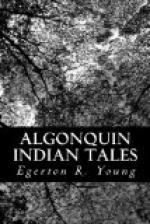“Not far off from them was another village whose people were called Mooswa, or Moose people, and Nanahboozhoo soon found out that, while the inhabitants of these two villages were antagonistic to each other, they frequently met to gamble, and that the Moose people were nearly always successful and had won from the Elk people nearly everything they possessed. The latter were very much humiliated at Nanahboozhoo’s finding them in such a wretched condition, but they told him they were convinced that some trickery had been practiced upon them by their opponents. They also informed Nanahboozhoo that they would be glad if he would help them to get back their much needed possessions.
“Nanahboozhoo promised that he would assist them on condition that after their possessions were regained they should give up the pernicious habit of gambling. This they unanimously promised to do. The first thing Nanahboozhoo did was to disguise himself as a whisky-jack and fly over to the village of the Moose people and try to discover how it was that they had been so invariably successful when they gambled with the Elk people. It was as he suspected. His old enemies the Anamakquis, the evil spirits that had destroyed his brother Nahpootee, the wolf, had sent one of their number among the Moose people, and he had enabled them to win nearly all of the dogs, as well as other things, from the Elk people. Indeed, he himself had generally been the one who had tossed the plum stones with which they gambled, and they had won by his magic powers.
“When Nanahboozhoo heard this he knew that his first work must be to secure the magic muskamoot (medicine bag). So he flew round and round, and peering in through the top of the wigwam, where the poles crossed each other, he was fortunate enough to see the magic bag hanging up on a cross pole over the place where the Anamakqui slept. He noticed also that it was well guarded and that it would require some cleverness on his part to get it.
“Nanahboozhoo was, as you know, a very clever fellow. He quickly flew back to the village of the Elk people and ordered the most industrious of the women, who were skillful in making fire bags, to make one exactly as he described. This was, of course, similar to the magic muskamoot he had seen hanging up in the tent.
“Nanahboozhoo then put into it things that would have just the opposite effect to those which were in the bag of the Anamakqui. He waited until it was dark, and then, noiselessly flying back to the village of the Moose people, he silently entered the wigwam at the top, where there was now a wide opening, as it was in the warm summer time, very quickly exchanged the bag he had with him for the magic muskamoot, and returned to the village of the Elk people. It did not take him long to arrange his plans. The chief of the Elks had a beautiful daughter, and it was given out that a fine young chief from a far-away tribe had come to ask for her in marriage. The father had welcomed this young chief—who was, of course, Nanahboozhoo—and as he had brought costly gifts he was at once acknowledged as the accepted son-in-law.




